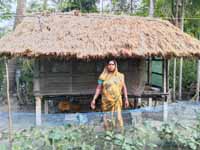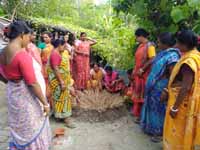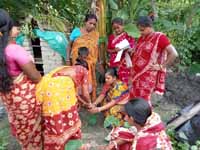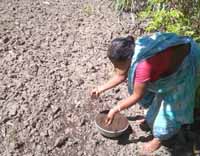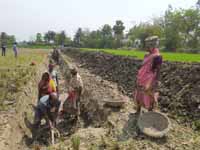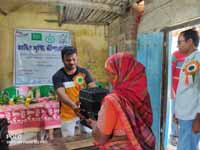Thirteen Blocks from South 24 Parganas District constitutes the major part of the Indian Sundarbans, the most critical and unique agro-climatic zone of the earth. The Sundarbans, facing severe crisis like- tropical cyclones, flood, submergence after monsoon and cyclic salinity requires technical and specific solutions towards managing it. In order to create the climate resilience through integrated natural resource management and sustainable livelihoods enhancement, South 24 Parganas district has conceptualized a unique programme partnership with a wide range of stakeholders e.g. a consortium of CSOs, research institutes, government departments in the state, International Govt. and Private agencies.
Matir Shristi Dwipanjali
Integrated approach on Water Conservation and livelihoods enhancement in Indian Sunderbans: Matir Sristi- "Dwipanjali"- an initiative by Panchayat & Rural Development Department

The District is in the verge of rolling out this special programme specially conceptualized as 'Dwipanjali', an 'anjali' (offering) to the 'dwip' (delta) with the consortium Civil Society Organizations like- DRCSC, Welthungerhilfe, Research and or academic institutes like Jadavpur University, Central Soil Salinity Research Institute-Canning, National Institute of Hydrology, British Geological Survey are actively involved in this project. Funding or the development support cost from German Government's, Federal Ministry of Economic Cooperation and Development (BMZ)
Objective of the project

Improving livelihood security of the rural community from 19 blocks of Indian Sundarbans adopting gram samsad based land water husbandry plans. More specifically,
i. Surface and ground water management,
ii. Promotion and sustenance of mangrove ecosystem of the Sunderbans and
iii. Ensuring sustainable livelihoods of the people through integrated natural resource management
The steps:
 Coaching Gram Panchayat functionaries in preparing land water management plan,
Coaching Gram Panchayat functionaries in preparing land water management plan,
 Facilitating Integrated Natural Resource based Management planning for each hamlet through Self Help Groups or other similar platforms,
Facilitating Integrated Natural Resource based Management planning for each hamlet through Self Help Groups or other similar platforms,
 Preparation of Detail Project Report for each Gram Panchayat,
Preparation of Detail Project Report for each Gram Panchayat,
 Facilitating the engagement of SHGs and other relevant community platforms in planning and execution,
Facilitating the engagement of SHGs and other relevant community platforms in planning and execution,
 Facilitation of multi-stakeholder platform for convergence in asset creation and ensuring inputs for utilization of the assets towards livelihoods enhancements,
Facilitation of multi-stakeholder platform for convergence in asset creation and ensuring inputs for utilization of the assets towards livelihoods enhancements,
 Inclusion of the 'Dwipanjali' producers in 'Sundarini' (A producers' collective promoted by GoWB) for technical inputs and accessing the wholesale markets.
Inclusion of the 'Dwipanjali' producers in 'Sundarini' (A producers' collective promoted by GoWB) for technical inputs and accessing the wholesale markets.
Outreach
 Blocks to be covered: 9 Blocks
Blocks to be covered: 9 Blocks  Gram Panchayat to be covered: 90 Gram Panchayat
Gram Panchayat to be covered: 90 Gram Panchayat  Community members to be trained: 10000
Community members to be trained: 10000
Target Households to be covered- 10,000 In Sundarini - 8000 women entrepreneurs, SHGs will be covered - 4400, MGNREGA Fund - 1200 Crore in 5 years, Development Support Cost for the CSOs for 5 years from BMZ, Germany.
Government-Civil Society partnership in development in West Bengal
 While Mahatma Gandhi NREGA covers the rural areas of the entire country and obviously the entire rural Bengal, the State Government tried to work through CSO partnership in certain specific areas having some unique problems requiring specialised interventions. Spring shed initiative was taken up in the hills, Usharmukti was initiated in the dry lateritic region of the state. Likewise, another area under contemplation for focused intervention was the Sunderbans. There are 19 development blocks spread over two districts of the state which fall under the extended Sunderban delta. The area has got certain unique problems and potentials of soil-water salinity and submergence requiring specialised intervention. Accordingly, the state government was considering developing partnership to initiate specialised intervention planning for this area. DRCSC, a partner since Usharmukti and having good presence in the area was included in the drive. Thus developed the concept, 'Dwipanjali', a special intervention plan for the Sunderban region of the state of West Bengal. In Dwipanjali 'Dwip' stands for delta (the largest mangrove delta in the earth) and 'Anjali' means offering, as a whole offering of a set of solutions to manage the problems of this delta, under this programme.
While Mahatma Gandhi NREGA covers the rural areas of the entire country and obviously the entire rural Bengal, the State Government tried to work through CSO partnership in certain specific areas having some unique problems requiring specialised interventions. Spring shed initiative was taken up in the hills, Usharmukti was initiated in the dry lateritic region of the state. Likewise, another area under contemplation for focused intervention was the Sunderbans. There are 19 development blocks spread over two districts of the state which fall under the extended Sunderban delta. The area has got certain unique problems and potentials of soil-water salinity and submergence requiring specialised intervention. Accordingly, the state government was considering developing partnership to initiate specialised intervention planning for this area. DRCSC, a partner since Usharmukti and having good presence in the area was included in the drive. Thus developed the concept, 'Dwipanjali', a special intervention plan for the Sunderban region of the state of West Bengal. In Dwipanjali 'Dwip' stands for delta (the largest mangrove delta in the earth) and 'Anjali' means offering, as a whole offering of a set of solutions to manage the problems of this delta, under this programme.
 The project aims to undertake management of natural resource-based assets to formulate community led models to conserve, restore and enrich the natural resource profile of flora and fauna in the impact area. The project will consider the interplay and interactions of the local people with the ecosystem and sustainable livelihood options. This will be facilitated by the formation of empowered local cadres of women belongs to self-help groups from the catchment area of the project. With the help of relevant agencies, they will find out the underlying causes of degradation of biotic and abiotic resources, raise awareness levels about its overexploitation and institutionalize a mechanism to safeguard and enrich the existing ecosystem. The women-led village organizations will further ensure food security through sustainable consumption and production patterns, management of inland water bodies, foster innovations etc.
The project aims to undertake management of natural resource-based assets to formulate community led models to conserve, restore and enrich the natural resource profile of flora and fauna in the impact area. The project will consider the interplay and interactions of the local people with the ecosystem and sustainable livelihood options. This will be facilitated by the formation of empowered local cadres of women belongs to self-help groups from the catchment area of the project. With the help of relevant agencies, they will find out the underlying causes of degradation of biotic and abiotic resources, raise awareness levels about its overexploitation and institutionalize a mechanism to safeguard and enrich the existing ecosystem. The women-led village organizations will further ensure food security through sustainable consumption and production patterns, management of inland water bodies, foster innovations etc.
Actors and the roles
WBNREGA envisages the same methodologies of putting in the programme as done in Jharnadhara and Usharmukti. Partnering with a couple of CSOs (PRASARI and DRCSC) is the only addition as the actors. The CSOs shall work in close coordination with the District Programme Coordinators (District Magistrates) and the District N octal Officers (MGNREGA) to facilitate the Gram Panchayats and the Blocks to come up with the samsad wise land-water management plans or the detail project reports (DPR) for their execution under MGNREGA. Convergence across the departments is envisaged towards the inputs and technology supports for the use of created assets for enhancing the livelihoods of the primary households.









